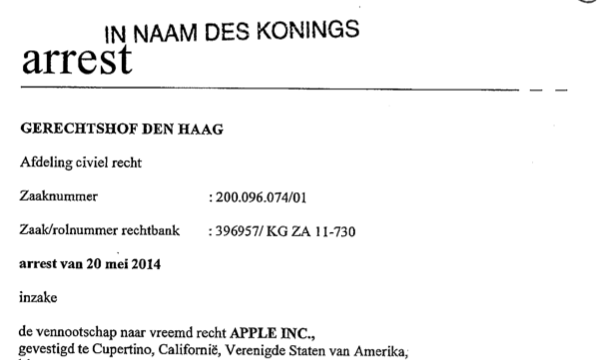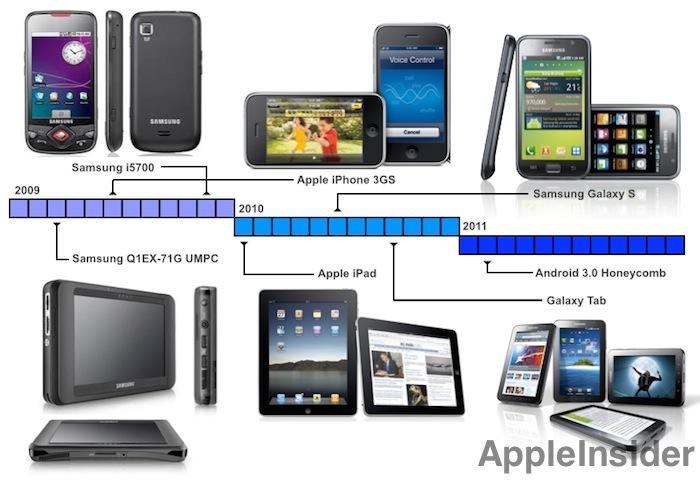Samsung lost an appeal in the Netherlands over its infringement of Apple's bounce-back patent, resulting in a broad injunction against selling accused devices and all other infringing devices that Samsung has introduced or will introduce.
The District Court of The Hague originally awarded Apple a ban on infringing Samsung Galaxy devices in an order back in November 2012.
That ban centered on European Patent EP2059868, and pertained to Samsung's use of Google's stock Android 2.2.1 or later, which began copying the iPhone technique Apple invented to simplify the navigation and direct manipulation of photos, often referred to as simply the "bounce back" patent.
Nearly a year after Samsung was found to infringe Apple's IP in The Netherlands, a German court was persuaded by Google to throw out Apple's rights over the same patent, based on the idea that Steve Jobs' original presentation of the iPhone's new technique in 2007 was "prior art," a line of reasoning that is legal in Germany.Samsung's strategy of delay has failed in that the infringement ban has been extended to all devices that similarly infringe
Samsung continued to contest Apple's win in The Netherlands for another year after the German case before again losing a final decision by the Court of Appeal of The Hague.
Because the case has dragged on for years, the original products found to infringe are now relatively ancient models, including the original Galaxy S, SII and Ace phones. However, Samsung's strategy of delay has failed in that the infringement ban has been extended to all devices that similarly infringe, including any future devices or renamed products Samsung can create in the future.
Google's Motorola, Samsung fight for the right to rip off Apple's inventions
Samsung created its own alternative to Apple's "bounce back" or "rubber banding" concept that involves a "blue flash" to indicate that the user has reached the end of a scrolling list. However, both Samsung and Google continued work together to deliver infringing versions of Apple's work instead.
While Google blamed Android's infringement in Germany on Jobs' demonstration, it has also continued to deliver intentionally infringing "pure Android" versions to other licensees in other countries that purposely copy Apple's iPhone rather than deliver original software that offers user interface inventions that might work equally as well.
In the U.S., Google argued on behalf of its Motorola Mobility subsidiary that Apple's patents should be ignored as worthless even as it distributed copies of Android that purposely emulated a variety of original elements of the iPhone that it knew to be patented.
Google's line of reasoning convinced Judge Richard Posner to sideline all claims in the Motorola vs. Apple case in 2012, a decision that was recently overturned by an appeals court that ruled Judge Posner "wrongly threw out the case."
Motorola now too weak to meaningfully infringe
However, in the years of delay between the dismissal and its overturning, Google's Motorola lost relevancy as an Android licensee as the subsidiary frittered away billions of dollars of Google's profits and failed to introduce any successful or profitable new Android products.
Google subsequently decided to sell off its Motorola unit as "discontinued operations."
As a result, Apple and Google jointly announced they would drop all claims in all jurisdictions related to Motorola's now virtually irrelevant history of infringement.
Google continues to fight for Android infringement
Despite dropping its Motorola-related lawsuits with Apple, Google continues its efforts to attack Apple's U.S. Patent No. 7,469,381 in the American Apple vs Samsung case, which covers the same "bounce back" invention.
Following its success in Germany, Google's efforts to attack Apple's invention in the U.S. serves as a tactic to reduce Samsung's nearly billion dollar penalty for infringing the patented invention in producing Galaxy phones designed to look and work identically to Apple's iPhone, beginning back in 2010.
A new tactic in protecting Android's infringement
Google's previous efforts to "protect Android" from infringement claims originally centered around buying up billions of dollars worth of patents and using these to support its licensees after they were sued.
However, this effort has proven to be both unsustainable expensive (particularly in the case of Motorola) and a legal dead end, due to the fact that most of the patents it acquired are already committed to FRAND (Fair, Reasonable and Non Discriminatory) licensing, which prevents them from being effectively used to win sales bans against Apple's products.
Following a series of losses around the world, most recently including its case in Japan, Samsung has similarly appeared to shift its efforts from attempting to weaponize FRAND-licensed Standards Essential Patents to instead undermine Apple's inventions and devalue patents in general.Samsung has been less successful in competing with Apple outside of the courts
In its second U.S. patent trial, Samsung's strategy involved buying up low-value patents and seeking tiny infringement claims over them.
This tactic appeared to work well, as it convinced a jury that its years of profiting from purposeful infringement of Apple's patents was only worthy of $120 million in damages.
Samsung has been less successful in competing with Apple outside of the courts: in the phone market it ships twice as many units as Apple but earns only half as much; in tablets Samsung has failed to achieve any significant headway despite closely copying Apple's iPad, and in technology its "leading by following" has failed to match Apple's lead in delivering modern ARMv8 Application Processors like the 64-bit A7 while also stumbling in its efforts to sell Knox-secured Android Galaxy products to government and enterprise clients.
 Daniel Eran Dilger
Daniel Eran Dilger








-m.jpg)






 Charles Martin
Charles Martin
 Christine McKee
Christine McKee
 Wesley Hilliard
Wesley Hilliard
 Malcolm Owen
Malcolm Owen
 Andrew Orr
Andrew Orr
 William Gallagher
William Gallagher
 Sponsored Content
Sponsored Content







51 Comments
Outstanding. :) Need this in the US.
[quote name="Phone-UI-Guy" url="/t/179852/apple-wins-broad-injunction-against-samsung-in-the-netherlands-over-bounce-back-patent#post_2536806"]Outstanding. :) Need this in the US. [/quote] I don't think Samsung sells any of the infringing devices anymore.
It will not happen in the US due to playoffs in Washington, DC. It is my belief both Google and Samsung have spent millions of US dollars lining politician pockets to block all attempts to reign in guilty verdicts against them in US court rooms.
We need more injunction coming to a city, state and country near you..
And some people want a peace treaty or they want Apple to abandon all litigation?
How does this win for Apple fit in with that defeatist state of mind?
Screw that, I want war, and I want Samsung to get what it deserves.